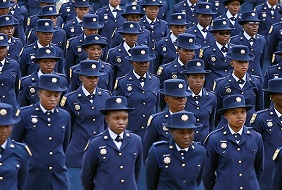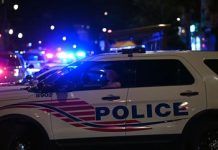The South African government plans to introduce stricter regulations in the private security industry – including the management of guns, guard dogs and uniforms. The proposed amendments to the regulations that govern the private security industry were recently gazetted.
Here are some of the proposed new regulations: Uniforms are not allowed to resemble police, defence force or correctional services uniforms in any way. “This includes that uniforms may not be made from fabric or other materials which are any shade of blue, or which have a camouflage design or pattern.” This will mean that many local security companies will have to change their uniforms – including the giant G4S, the largest security company in Africa, which has some 15,000 trained security staff in South Africa.
Companies that have uniforms, badges or insignia which are “reasonably capable of being mistaken for” that of the police, defence forces or correctional services could be fined and/or imprisoned for up to 24 months. Uniforms must be clearly marked with a variety of badges. All private security guards will have to wear a badge (at least 10cm long, and 1.5cm in height) with the words “Private Security” in future.
Guards also need to wear two badges with the company name, as well as a badge with their name and personal registration number clearly legible on it. All logos and uniforms have to be approved. Security firms will only be registered in future if a business has submitted the design of their insignia and uniforms to the Private Security Industry Regulatory Authority.
The new regulations also introduced stricter rules for guns. This includes that security workers are not allowed to use their own firearms in the course of their work, but security firms must lawfully provide a suitable firearm for that purpose. Offending security firm owners could be imprisoned or fined, or both. The new regulations also stipulate detailed rules governing the care of guard dogs, including that fresh water must be available to a working animal at all times, and that water and food for security dogs must be protected from direct sunlight. Adult security dogs must be fed daily








